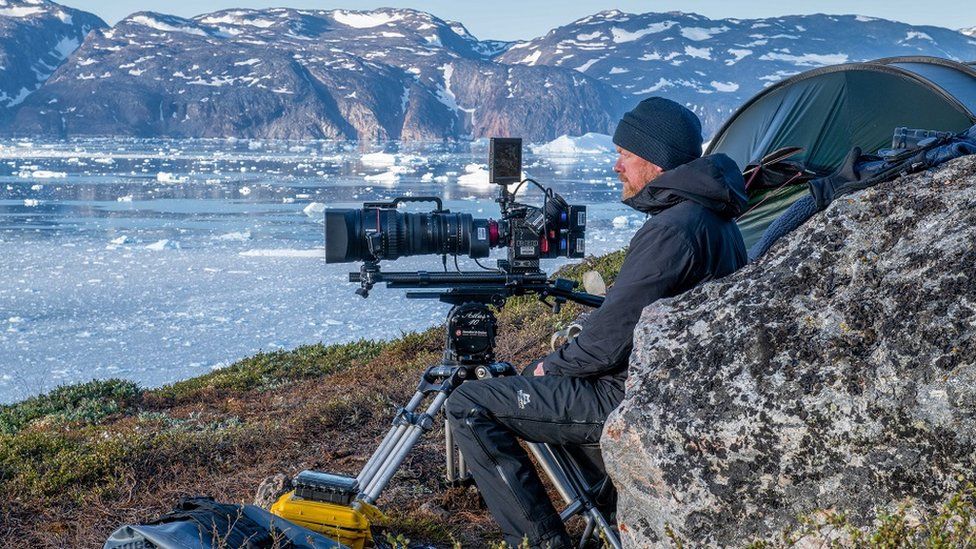Frozen Planet: Filming climate change in action on an Arctic glacier
- Published

Shooting sequences for the BBC's new Frozen Planet series brought Raymond Besant up close to the dramatic effects of climate change in the Arctic.
"Greenland is one of those dream locations," says the Orkney-based film-maker.
"It's exciting from the perspective of going to a new place and hopefully seeing something pretty epic."
He travelled to the west coast of the world's largest island last year after getting a phone call from the makers of Frozen Planet during lockdown.
His job was to film huge blocks of ice breaking off the gigantic Store Glacier in a process called calving.
The footage was to help show the scale of how Greenland's vast ice sheet was melting due to warmer temperatures in polar regions.
Greenland's west side is often shrouded in fog and there were a few days of waiting around before Raymond got the call to say that the weather was good enough for filming.
"We threw everything into a helicopter and headed out," says Raymond.
"We could soon see some of the icebergs that had already come off the glacier and then the glacier itself - it's absolutely enormous.
"The front of the Store Glacier is 5km wide and flying quite close we could see bits falling off."
The experience caused mixed emotions for Raymond.
He says: "At the glacier it is a very visual representation of what climate change looks like.
"It's quite an easy way to show that more ice is falling off and the glacier is calving at a faster rate because of climate change.
"But it is quite a conflicting feeling.
"You want the ice to fall off so you can film it, because a lot of effort has gone into you being there - but then you are witnessing climate change in action. It's a kind of bittersweet feeling."
It was also unusual for Raymond because did not film any animals, the usual subject for his filming and photography.
He is more used to lying in wait for hours to capture images of an elusive creature.
After university and time working as a newspaper photographer, Raymond started to pursue his passions for photography and the natural world in the late 1990s.
He started out filming in Scotland for programmes like Natural World and Highlands - Scotland's Wild Heart. That led to jobs on the BBC's Spring, Autumn and Winterwatch shows.
"Once you're more established people trust you to go abroad to shoot sequences," says Raymond.
"So, especially in the last couple of years, I've been shooting various films in Africa, Northern Europe, China and Sri Lanka."
He adds: "But people don't believe me when I say I am as happy to see an otter on the shore in Orkney as I am happy to see a forest elephant or a lion.
"It is still an animal and it is the behaviour of that animal that really interests me."
Raymond says he has seen the effects of climate change in Scotland's wild places.
Scotland is home to Arctic specialists - birds like dotterel, snow bunting and ptarmigan - which are found high on Scotland's mountains.
Raymond fears climate change is pushing these species to the limits of where they can survive.
"I think there is going to more of an impact on them in coming years," he says.
Frozen Planet II is showing on BBC One on Sundays.